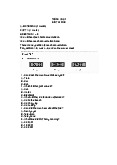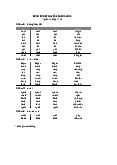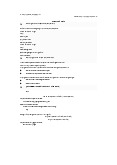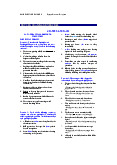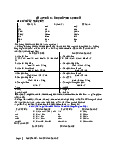










Preview text:
REVIEW
BẢNG ĐẠI TỪ NHÂN XƯNG – TÍNH TỪ SỞ HỮU VÀ CÁC THÀNH TỐ ĐI KÈM Đại từ nhân Nghĩa Tính từ Động từ xưng sở hữu Động từ thường Trợ Động Từ to be Tôi I My am was Chúng tôi / We Our chúng ta Vo have do Bạn / các bạn You Your are were Họ / Những cái They Their đó Anh ấy He His Cô ấy She Her is was Vs/es has does Nó It Its
1. Present Simple (Hiện tại đơn)
- Diễn tả một thói quen, một hành động lặp đi lặp lại trong hiện tại.
- Diễn tả một chân lí, một sự thật hiển nhiên.
- Nói về một lịch trình có sẵn, kế hoạch cố định.
- Dùng trong câu điều kiện loại 1 (Mệnh đề If). Loại câu Động từ thường
Động từ “to be”
S (He, She, It , S- ít…) + Vs/es + O. Khẳng định S + tobe (am/is/are) + O.
S (I, We, You, They, S-nhiều..) + Vo + O. Phủ định S + do not /does not + V + O. o S + be (am/is/are) + not + O. Nghi vấn Wh- + Do/Does + S + V + O? o Am/is/are + S + O?
Trong câu có chứa các trạng từ chỉ tần suất như
Every day/ week/ month…: mỗi ngày/ tuần/ tháng
Often, usually, frequently: thường Dấu hiệu
Sometimes, occasionally: thỉnh thoảng
Always, constantly: luôn luôn Seldom, rarely: hiếm khi
- Với động từ (V) có tận cùng là phụ âm “y”, chuyển “y” thành “ies”. Ngoại trừ “play” => Lưu ý “plays” BÀI TẬP Động Từ Tobe
1. Hoàn thành câu khẳng định sử dụng động từ tobe ở
2. Hoàn thành câu phủ định sử dụng động từ tobe thì Hiện tại đơn ở thì Hiện tại đơn 1. You __________ beautiful. 1.
He _____________ in the bathroom. 2. I __________ hot. 2. We _____________ thirsty. 3. I __________ from London. 3. It _____________ sunny. 4. You __________ a doctor. 4. You _____________ a teacher. 5. Emily __________ my sister. 5. They _____________ at school.
6. He __________ in the garden. 6.
Lucy _____________ from the USA. 7. They __________ on the bus. 7. I _____________ a nurse. 8. We __________ friends. 8. He _____________ sleepy. 9. I __________ 25 years old. 9. We _____________ at home. 10. She __________ sick. 10. You _____________ from France.
3. Hoàn thành câu hỏi Yes/No với động từ tobe ở thì
4. Hoàn thành “câu hỏi có từ để hỏi” (Wh-) Hiện tại đơn.
sử dụng động từ tobe ở thì Hiện tại đơn 1. We / on time? 1. What time / it now?
___________________________________________
___________________________________ 2. Pedro / from Spain? 2. Where / Pedro / from?
____________________________________________
___________________________________ 3. They / in Tokyo?
3. Why / they / in the kitchen?
____________________________________________
___________________________________ 4. Julie / at home? 4. How / the food?
____________________________________________
___________________________________ 5. The children / at school? 5. How long / the journey?
____________________________________________
___________________________________ 6. You / in a cafe? 6. How old / you ?
____________________________________________
___________________________________ 7. I / right? 7. Why / I / last ?
____________________________________________
___________________________________ 8. We / in the right place? 8. What time / the concert?
____________________________________________
___________________________________ 9. She / German? 9. Where / she?
____________________________________________
___________________________________ 10. He / a doctor? 10. Who / Julie / with?
____________________________________________
___________________________________ Động Từ Thường
Bài 1: Bài tập thì hiện tại đơn – Chọn dạng đúng của từ
Bài 2: Chia động từ trong ngoặc ở thì hiện tại đơn.
1. Sarah ___________ (go/goes) to the gym every day.
1. My friend __________ (live) in London.
2. The students ___________ (study/studies) hard for
2. They __________ (study) English at the the exam. university.
3. My parents ___________ (watch/watches) movies
3. We __________ (play) football every weekend. on weekends.
4. She usually __________ (go) to the gym after
4. He ___________ (plays/play) basketball every work. Saturday.
5. The cat __________ (sleep) on the sofa.
5. She usually ___________ (eat/eats) dinner at 7 p.m.
6. He __________ (like) to eat pizza.
6. They ___________ (visit/visits) their grandparents
7. I __________ (watch) a movie right now. once a month.
8. They __________ (travel) to different countries
7. Peter ___________ (work/works) as a doctor. every year.
8. We ___________ (like/likes) to travel to new places.
9. We __________ (have) lunch at 12 o’clock.
9. The dog ___________ (barks/bark) at strangers.
10. She __________ (read) a book in the park.
10. He ___________ (drinks/drink) coffee in the
11. He __________ (work) as a teacher. morning.
12. The train __________ (arrive) at 8 a.m.
13. We __________ (drink) coffee in the morning.
14. They __________ (play) the guitar very well.
15. She __________ (teach) English at the language center.
16. She _______ (study) hard so that she can get into a top university.
17. We _______ (travel) to different countries every summer.
18. The company _______ (develop) innovative
products to stay ahead in the market.
19. He _______ (work) tirelessly to achieve his goals.
20. I _______ (work) as a Marketing editor in AHK company.
Bài 3. Sắp xếp các từ đã cho sẵn thành câu ở thì Hiện
Bài 4. Viết các câu sau dưới dạng phủ định tại đơn
1. They always go to the beach in the summer.
1. often / he / plays / football / on Sundays.
_______________________________________
____________________________________________
2. She often visits her grandparents on Sundays. _
________________________________________
2. go / usually / to / we / the park / on weekends.
3. We usually have breakfast at home.
____________________________________________
________________________________________ _
4. He sometimes plays guitar at parties.
3. breakfast / have / I / at / 7 a.m.
________________________________________
____________________________________________
5. I often read books before going to bed. _
_______________________________________
4. English / she / teaches / at / a school.
Bài 5: Viết lại các câu sau dưới dạng câu nghi
____________________________________________ vấn _ 1. She lives in New York.
5. reads / every / book / she / night / before / bed.
________________________________________
____________________________________________ 2. They speak French fluently. _
________________________________________
6. often/ go/ they/ hiking/ on weekends.
3. We play soccer every weekend.
____________________________________________
________________________________________ _ 4. He works as a doctor.
7. she/ cook/ delicious meals/ always.
________________________________________
____________________________________________ 5. The train arrives at 9 a.m. _
________________________________________ 8. alcohol/he/ never/ drink/ _
____________________________________________ _
9. a walk/ in the evening/ we/ usually/ take.
____________________________________________ _ 10. fast food/ I/ eat/ rarely
____________________________________________ _
2. Present Continuous (Hiện tại tiếp diễn)
- Diễn tả một hành động xảy ra tại thời điểm nói.
- Diễn tả một hành động sắp xảy ra trong tương lai gần, thường diễn tả một kế hoạch đã lên lịch sẵn. Khẳng định
S + tobe (is/am/are) + V_ing + O Phủ định
S + tobe (is/am/are) + not + V_ing+ O Nghi vấn
Tobe(is/am/are) + S + V_ing + O ?
* Trạng từ chỉ thời gian:
* Một số động từ: now (bây giờ) Look!/ Watch! (Nhìn kìa) right now (ngay bây giờ) Listen! (Nghe này!) Dấu hiệu at the moment (ngay lúc này)
Keep silent! (Hãy giữ im lặng!) at present (hiện tại)
Watch out! = Look out! (Coi chừng!)
It’s + giờ cụ thể + now
- Đối với những động từ kết thúc bằng một Phụ âm + “ (b, c, d, f, m, n, t, …) , chúng ta e” bỏ “ ” và thêm “ e
ing”. Ex: live => living,
- Khi động từ một âm tiết kết thúc bằng phụ
âm + nguyên âm (a, e, i, o, u) + phụ âm =>
gấp đôi phụ âm cuối và thêm “ing”. Ex: run Lưu ý
=> running, stop => stopping..
- Khi động từ có hai hoặc nhiều âm tiết, kết
thúc bằng phụ âm + nguyên âm + phụ âm,
trọng âm không rơi vào âm tiết cuối =>
không gấp đôi phụ âm cuối và thêm “ing”.
Ex: Remember => remembering,
demonstrade => demonstrading… BÀI TẬP
Bài 1. Hoàn thành câu với những từ đã cho ở Thì Hiện tại tiếp diễn. 1. What/ your two 1. She/ wash / her hair.
=>______________________________________ kids/ do? 2. It/ snow.
=>_______________________________________ =>___________________ 3.
Jack and Rose/ sit/ on the couch.
=>_______________________________________ _________________ 4. It/ rain/ heavily.
=>_______________________________________ 2. It/ snow/ ? 5. Linda/ learn/ French.
=>______________________________________ 6.
My dad/ listen/ to the stereo.
=>______________________________________ 7.
My friends/ smoke/ in their rooms. =>___________________
=>______________________________________ 8. I/ play/ video games. _________________
=>______________________________________ 9. You/ watch/ movies? 3. That computer/
=>_____________________________________ 10. What/ you/ think? work?
=>_____________________________________ =>___________________ ___________________ 4. Jane/ write/ a novel. =>___________________ _________________ 5. Why/ you/ cry ? =>___________________ _________________
Bài 2. Chia động từ trong
ngoặc ở thì Hiện tại tiếp diễn. 6. Look! The car (go)___________ so fast. 7. Listen! Someone (cry) ______________ in the next room. 8. Your brother (sit) ________________ next to the beautiful girl over there at present? 9. Now they (try) _________________ to pass the examination. 10. It’s 12 o’clock, and my parents (cook) _______________ lunch in the kitchen. 11. Keep silent! You (talk) ________________so loudly. 12. I (not stay) ________________ at home at the moment. 13. Now she (lie) _________________to her mother about her bad marks. 14. At present they (travel) ______________ to New York. 15. He (not work) _________________in his office now.
3. Đại từ nhân xưng – Tính từ sở hữu (Personal
Pronouns – Possessive Adjective) 1. (you) This is 11. (you) How do you ________ pen. spell ____ last name? 2. (we) _______ 12. (We) Oh, no! That’s parents are from ______train. Britain. 13. (They) _______ names are Sophie and 3. (they) These are Ellie. _________ bags. 14. (You) This is 4. (I) ___________ ________ chair. name’s Peter. 15. (you) They’re ________ boots. 5. (you) Is 16. (She) This is
this________ teacher? _________bag. 6. (they) _____ 17. (We) That’s mother is from _________hotel. London. 18. (I) Where’s ________ 7. (you) car? What’s _____ name? 19. (He) This is _______ 8. (He) smart phone. They’re ____ dogs. 20. (You) How was 9. (Our) ________ day? They’re ____ children. 10. (They) That’s house. ______
4. Lượng từ bất định (Indefinite Quantifiers)
Lượng từ bất định (indefinite quantifiers) là loại lượng từ đứng trước danh từ dùng để chỉ số lượng ,
nhiều của danh từ đó nhưng không xác định rõ là bao nhiêu.
1. Some (một vài) / (nhiều) : Đi với cả los of
2. A little (một chút) / much (nhiều): đi với danh từ
danh từ đếm được số nhiều và danh từ không không đếm được. đếm được.
* Much : chủ yếu dùng trong câu phủ định và câu
* Chủ yếu dùng trong câu khẳng định. hỏi.
3. any (bất kì) : đi với cả danh từ đếm được số
nhiều và danh từ không đếm được.
* Chủ yếu dùng trong câu phủ định và câu hỏi. Bài tập luyện tập
1. I don’t eat _______________ (any/a little) frunk food.
2. We drink ________________ (lots of/much) water every day.
3. How __________________(much/any) fruit did you eat yesterday.
4. He does _______________ (much/a little) exercise in the morning.
5. She doesn’t _____________ (any/some) exercise. Đáp án chi tiết
1. I don't eat any junk food.
(Tôi không ăn đồ ăn vặt.)
=> Câu phủ định “don’t” => dùng “any” 2. We drink water every day lots of .
(Chúng tôi uống nhiều nước mỗi ngày.)
=> much + N (không đếm được) thường dùng trong câu phủ định và nghi vấn => lots of
3. How much fruit did you eat yesterday?
(Hôm qua bạn có ăn nhiều hoa quả không?)
=> How much + N (không đếm được)? (Bao nhiêu) => much
4. He does a little exercise in the morning.
(Anh ấy ít tập thể dục vào buổi sáng.)
=> much + N (không đếm được) thường dùng trong câu phủ định và nghi vấn => a little
5. She doesn't do any exercise.
(Cô ấy không tập thể dục.)
=> Câu phủ định “doesn’t” => any
5. Prepositions of place (Giới từ chỉ nơi chốn)
in front of : phía trước next to : bên cạnh behind : phía sau
opposite : đối diện Nhìn bản đồ và khoanh từ đúng. 1. Let's meet at the café opposite/ next to the movie theater. (Chúng ta hãy gặp nhau ở quán cà phê đối diện/ gần rạp chiếu phim.) 2. The bookstore is in front of/ behind the café. (Hiệu sách ở trước/ sau quán cà phê.) 3. Do you want to meet at the market opposite/ behind the movie theater? (Bạn có muốn gặp ở
chợ đối diện/ đằng sau rạp chiếu phim không?) 4. The clothing store is in front of/ behind the ice cream store. (Cửa hàng quần áo ở trước/ sau quán kem.) 5. I often go running in the park next to/ behind the market. (Tôi thường chạy đến công viên gần/ sau chợ.) 6. The boy is behind the room. 8.Our house is the park. near
=> The room______________________________ => The park
7. The ice rink is in front of the theater. ______________________________
=> The theater____________________________ 9. The class room is the library opposite . => The library ____________________________
6. Modal Verb (Động từ khiếm khuyết) : should/shouldn’t
Chúng ta dùng Động từ khiếm khuyết should / shouldn’t để đưa ra lời khuyên.
Theo sau động từ khiếm khuyết là động từ nguyên mẫu (V-inf/Vo): modal verb + Vo 6.1 Sắp xếp lại câu
1. shouldn't/TV./You/much/watch/too
=>________________________________________________________________________
(Bạn không nên xem quá nhiều TV.)
2. do/What should/healthier?/I/to/become
=>________________________________________________________________________
3. exercise./He/much/do/doesn't
=>________________________________________________________________________
4. get/a/Teens/hours/night./nine/should/sleep/of
=>________________________________________________________________________
5. of/shouldn't/candy./ You/eat/lots
=>________________________________________________________________________
6.1 Điền vào chỗ trống should / shouldn’t để có được câu hoành chỉnh.
1. You _______________stay up too late because it’s not good for your health.
2. No one _______________ be late for school tomorrow because we will have an exam.
3. I think there ________________be a garbage dump in front of the restaurant.
4. You _________________ go for a check-up regularly.
5. I think you ______________ be more tactful.
